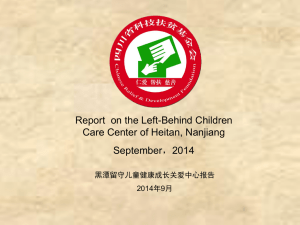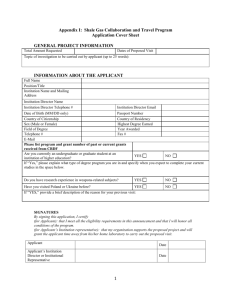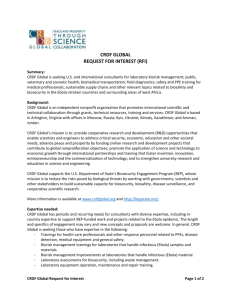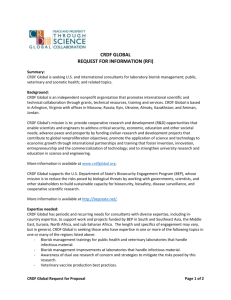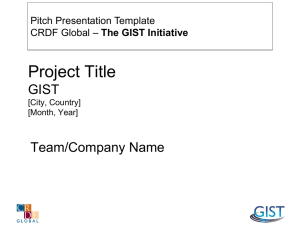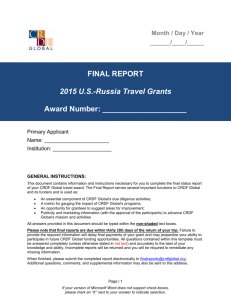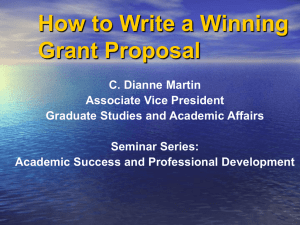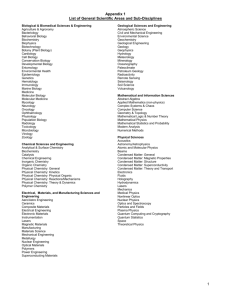Graduate Scientists Grant Competition - Program
advertisement
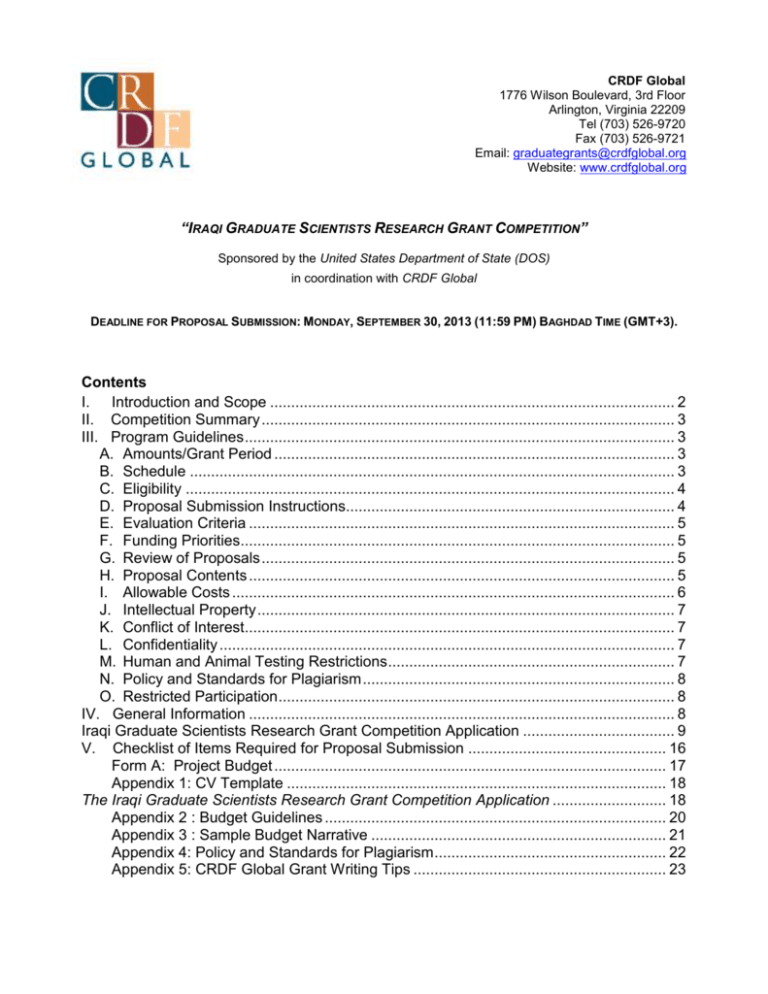
CRDF Global 1776 Wilson Boulevard, 3rd Floor Arlington, Virginia 22209 Tel (703) 526-9720 Fax (703) 526-9721 Email: graduategrants@crdfglobal.org Website: www.crdfglobal.org “IRAQI GRADUATE SCIENTISTS RESEARCH GRANT COMPETITION” Sponsored by the United States Department of State (DOS) in coordination with CRDF Global DEADLINE FOR PROPOSAL SUBMISSION: MONDAY, SEPTEMBER 30, 2013 (11:59 PM) BAGHDAD TIME (GMT+3). Contents I. Introduction and Scope ................................................................................................ 2 II. Competition Summary .................................................................................................. 3 III. Program Guidelines ...................................................................................................... 3 A. Amounts/Grant Period ............................................................................................... 3 B. Schedule ................................................................................................................... 3 C. Eligibility .................................................................................................................... 4 D. Proposal Submission Instructions.............................................................................. 4 E. Evaluation Criteria ..................................................................................................... 5 F. Funding Priorities....................................................................................................... 5 G. Review of Proposals .................................................................................................. 5 H. Proposal Contents ..................................................................................................... 5 I. Allowable Costs ......................................................................................................... 6 J. Intellectual Property ................................................................................................... 7 K. Conflict of Interest...................................................................................................... 7 L. Confidentiality ............................................................................................................ 7 M. Human and Animal Testing Restrictions .................................................................... 7 N. Policy and Standards for Plagiarism .......................................................................... 8 O. Restricted Participation .............................................................................................. 8 IV. General Information ..................................................................................................... 8 Iraqi Graduate Scientists Research Grant Competition Application .................................... 9 V. Checklist of Items Required for Proposal Submission ............................................... 16 Form A: Project Budget ............................................................................................. 17 Appendix 1: CV Template .......................................................................................... 18 The Iraqi Graduate Scientists Research Grant Competition Application ........................... 18 Appendix 2 : Budget Guidelines ................................................................................. 20 Appendix 3 : Sample Budget Narrative ...................................................................... 21 Appendix 4: Policy and Standards for Plagiarism ....................................................... 22 Appendix 5: CRDF Global Grant Writing Tips ............................................................ 23 I. Introduction and Scope The United States Department of State (DOS), in collaboration with their implementing partner CRDF Global, is pleased to announce the “Iraqi Graduate Scientists Research Grant Competition.” The competition seeks to: Increase the capacity for research that is being directed towards critical issues in biology and chemistry at universities throughout Iraq; Encourage graduate student-faculty collaboration; Promote the peaceful and sustainable redevelopment of Iraq’s science and technology infrastructure through cooperative science. This competition is open to Iraqi graduate students and faculty in Biology and Chemistry programs at Iraqi universities. To be eligible for the grant, applicants must reside in Iraq for the duration of the grant. Applications must include the curriculum vitae (CV) of all project team members. The competition will provide one-year awards of up to US $25,000 each. Proposals must focus on a biological or chemical research area. All proposals focusing on biological or chemical sciences are eligible for this competition and will be evaluated. However, funding preference will be given to proposals in the following research areas: Biological Sciences: Molecular Biology/Genetics Immunology Cell/Developmental Biology Microbiology (including public health or veterinary applications) Chemical Sciences: Organic Synthesis Natural Product Extraction/Purification Inorganic Chemistry Chemical Engineering/Material Science Funding preference will be given to proposals that include at least one faculty member and at least one graduate student in order to encourage faculty-student collaboration. About the United States Department of State The United States Department of State (DOS) supports the redevelopment of Iraq’s science and technology infrastructure. DOS outreach programs sponsor scientific conferences, technical trainings, and research grant competitions to advance Iraq’s science capacity and to connect Iraqi scientists and engineers to the international scientific community. DOS activities simultaneously seek to promote research and to improve laboratory practices. For instance, DOS-supported programs strengthen Iraqi disease detection and diagnosis capabilities, while enhancing biosafety and biosecurity, combating emerging infectious diseases, and preventing the misuse of biotechnology. Likewise, DOS programs raise chemical security awareness by providing technical trainings and workshops on best practices for the secure handling and management of chemicals for academic, industrial, and governmental laboratories; fostering national and regional dialogue focusing on improving chemical security, and promoting and strengthening scientific cooperation among chemical professionals and institutions. About CRDF Global CRDF Global is an independent nonprofit organization authorized by U.S. Congress and established in 1995 by the National Science Foundation (NSF). This unique organization promotes international scientific and technical collaboration through grants, technical resources, training and services. More information about CRDF Global can be found at http://www.crdfglobal.org. 2 II. Competition Summary Competition Opens Wednesday, August 14, 2013 Submission Deadline Monday, September 30, 2013 11:59 PM Baghdad Time (GMT +3) How to Apply Email the completed application to graduategrants@crdfglobal.org. Applications will not be accepted as hard copies. Chemical Sciences, including: Organic Synthesis Natural Product Extraction/Purification Inorganic Chemistry Chemical Engineering/Material Science General Research Area(s) and Biological Sciences, including: Molecular Biology/Genetics Immunology Cell/Developmental Biology Microbiology (including public health or veterinary applications) Basic Eligibility Proposals must include an Iraqi PI who is a faculty member or graduate student at an Iraqi university. All project team members must be Iraqi citizens. Award Amounts Each up to $25,000 USD Announcement of Competition Results Late 2013 via e-mail III. Program Guidelines A. AMOUNTS/GRANT PERIOD This competition will award research grants of up to a maximum of US $25,000 each. Grants will be awarded for a period of up to one (1) year. B. SCHEDULE Proposals will be accepted starting August 14, 2013, and must be submitted via email to graduategrants@crdfglobal.org. The deadline for submitting a proposal to this competition is Monday, September 30, 2013, at 11:59 PM Baghdad Time. Proposals submitted after this deadline will not be eligible for this grant competition. No exceptions to this condition will be granted. CRDF Global will announce the results of this competition through email in late 2013. Submission Deadline Announcement of Results Monday, September 30, 2013 11:59 PM Baghdad Time (GMT+3) Late 2013 3 C. ELIGIBILITY Proposals must meet the following criteria to be considered eligible for this grant competition: 1. Proposals must be received electronically by CRDF Global before the competition’s submission deadline of Monday, September 30, 2013 11:59 PM Baghdad Time (GMT+3). Proposals submitted to CRDF Global after this date will not be accepted. 2. Each proposal must contain all requested information listed in Section (II) (H. Proposal Contents) (p. 5). Submissions that do not adhere to the program guidelines will be ineligible. 3. The Principal Investigator (PI) of each application must be a faculty member or graduate student at an Iraqi university. 4. All project team members must be Iraqi citizens. The PI must currently reside in Iraq, and must reside in Iraq throughout the grant period. 5. Each PI may submit only ONE proposal to this competition. PIs may apply to the competition as a non-PI participant for more than one project; however, researchers are not eligible to receive grant funding more than twice (once as Principal Investigator and once as a participant). 6. All projects must be carried out in a civilian research environment for peaceful scientific application. 7. Proposed research must not involve testing of live human or animal subjects, or collection of blood, tissue, or other material from human or animal subjects. See Section II (M. Human and Animal Testing Restrictions) (p.7) for guidelines regarding the use of previously collected samples. 8. All proposals must be in English. Proposals in Arabic will not be accepted. 9. Each proposal is evaluated independently and therefore should not be part of, or depend on, the success of other proposals submitted to this competition. 10. CRDF Global reserves the right to restrict the participation of any individual or institution in its programs. CRDF Global complies with all U.S. laws and regulations pertaining to export control and the participation of foreign nationals or institutions in its activities. It is the policy of CRDF Global not to conduct transactions with U.S. restricted entities without appropriate authorization from the U.S. government. D. PROPOSAL SUBMISSION INSTRUCTIONS Proposals should be submitted via email to graduategrants@crdfglobal.org beginning on August 14, 2013, and up to the deadline on September 30, 2013. Proposals should be submitted in PDF or Microsoft Word format. Each proposal must adhere to the following elements described below. Only applications that include this information will be considered eligible and complete for review. All proposals should be: Typed. Handwritten applications will not be accepted. Proposals should also use Arial font or similar and a font size of no less than 10 point. Single-spaced. In English. Formatted with margins of 2.5 cm at the sides, top, and bottom. Formatted with pages numbered consecutively in the upper right corner. To submit a complete grant application, the proposal must include all of the following: A grant application, with basic information about the proposal. The signature of the PI and a host institute representative. A proposed budget and budget narrative that explains the proposed budget costs. CVs for all project personnel. 4 Proposals should be submitted only ONCE and only by the proposal’s Principal Investigator. CRDF Global will email the Principal Investigator to confirm receipt of the proposal. E. EVALUATION CRITERIA CRDF Global experts will utilize the following criteria in the scientific merit evaluation of proposals for this competition. The first two serve as CRDF Global's primary and most important criteria, and must be met by all projects; the remaining four serve as supplementary criteria, as appropriate to the nature of each project. 1. Technical Merit: Whether the project proposes new research and how well the individual elements of the research plan fit with the overall project goals. 2. Research Plan: The technical soundness of the proposed work, practicality of the project’s management plan, and adequacy of the resources available, both technical and financial. 3. Research Impact in Priority Funding Areas: The probability that the project will result in new knowledge or have an impact on one or more of the preferred Biological or Chemical research fields stated in Section (I) (Introduction and Scope). 4. Personnel Capacity: The expertise of the investigators and other participants, including how each partner will contribute to the success of the project and to future research goals. 5. Faculty-Student Collaboration: Whether the proposed work includes detailed plans for faculty and graduate student collaboration over the course of the project that will allow graduate students to gain experience in international research grants and will encourage future collaboration. 6. Benefit to Iraq: Appraisal of the project’s provision of opportunities for personnel, the sharing of equipment and resources among all institutions involved, and the project’s long-term positive impact on Iraq. F. FUNDING PRIORITIES In order to distinguish between proposals judged to have equal merit according to the evaluation criteria above, priority will be given to proposals that: Assist in achieving DOS and CRDF Global’s mission of safe and secure chemical and biological research as well as responsible scientific conduct; Applicants who, by virtue of their specific areas of expertise and prior research and professional experience(s) in Iraq, are determined to be uniquely positioned to make distinctive contributions to the reconstruction and advancement of Iraq’s civilian science and technology community; Include project team members that possess a PhD level academic degree, or equivalent research experience. G. REVIEW OF PROPOSALS All proposals and information contained therein will remain confidential prior to the award and will be screened for eligibility and completeness upon receipt by CRDF Global. Scientific merit review will be conducted by expert reviewers. The reviewers will assign an overall rating to each proposal and rank each proposal based on this rating. Once the ranking is complete, final recommendations for funding will be transmitted to DOS, who will make the final funding decision. Following a final decision, all grant applicants will be notified of their application status through email by CRDF Global. The criteria described above in Section (II) (E. Evaluation Criteria and F. Funding Priorities) (pp. 4-5) will form the basis for the proposal reviews. All awards are subject to the availability of funding from the DOS program that is sponsoring this competition. All decisions by CRDF Global and DOS are final. H. PROPOSAL CONTENTS All proposals must be written in English. We highly encourage all applicants to review the Grant Writing Tips document in Appendix 5 (p. 22). These resources include sample forms and examples on how to avoid common mistakes in proposal preparation. Any applicant questions should be addressed directly to CRDF Global through graduategrants@crdfglobal.org. Each applicant must complete every field in the application for it to be considered complete. 5 Applicants should submit the application in this program announcement, which begins on page 9. Applicants should follow the guidelines listed below when composing their application. Prior to submission, please refer to the Checklist of Documents Required for Proposal Submission located in Section (IV. Checklist) (p. 15). 1. Abstract. In no more than 400 words, summarize all relevant aspects of the project, with special attention to its goals and objectives, methods, and anticipated benefits. 2. Project Narrative. The project narrative should describe the following in detail: a. The approach, objectives, implementation process, milestones, and measurements of success that will be used; i. A clearly defined project timeline, noting all project tasks and goals to be accomplished during each quarter. ii. The project timeline should also include how the graduate student(s) will be involved in the different stages of the project, if applicable. b. How the combined competencies of the team members will enable the project to be carried out, and what relevant prior work has been carried out by members of the team (relevant prior CRDF Global awards must be described); c. The anticipated results of the project and how they address the evaluation criteria listed in Section (II) (E. Evaluation Criteria) (p. 4); d. How the project compares to current research conducted in the topic area in Iraq; e. Equipment to be utilized in the project, with special attention to justifying requests for any equipment for which grant support is requested. 3. Curricula Vitae (CV). The proposal must contain a curriculum vitae for all project participants, including, but not limited to, project Principal Investigators, Co-Investigators, Graduate Students, Research Assistants, Technicians, and Administrative Staff. CVs should contain all pertinent information, including full name as written in their passport, current address, email and other contact details, complete histories of employment experience and educational background post high school level, current and previous institutional affiliations with dates, scientific area(s) of expertise, and, if applicable, most recent publications of relevance to the topic of the proposal. A CV template can be found in Appendix 1 (p. 17). 4. Project Budget (FORM A) (p. 16). A budget that follows the criteria outlined in Form A must be submitted as part of the proposal. Applicants should submit one project budget Form A for the entire award period, and should refer to the Budget Guidelines in Appendix 2 (p. 19) for information to be listed in the budget. 5. Budget Narrative. A separate single sheet explaining all budget items in detail must follow the budget form. This sheet should be clearly marked “Budget Narrative.” Applicants should refer to the “Allowable Costs” in Section (II) (I. Allowable Costs) (p. 6) and the Budget Guidelines in Appendix 2 (p. 19) for information that should be described in detail in the Budget Narrative. Equipment with a value of over $1,000 for which CRDF Global support is requested must be explained in the budget narrative, as in Appendix 3 (p. 20). I. ALLOWABLE COSTS The total maximum grant amounts awarded will be US $25,000 each for up to one year (12 months) of field and laboratory research. In the case an award is granted, the project budget may be subject to revision by CRDF Global staff. The following costs are permitted under CRDF Global guidelines for this program: 1. Equipment, Supplies, and Services. Support for research equipment, including laboratory equipment and consumables, reagents, computers and telecommunications devices and/or services, subscriptions to scientific journals, and other materials to be used in the research. Any item of requested equipment valued at more than $1,000 must be specifically described and justified in the Budget Narrative. If the proposal is to include services of professional consultants or service providers such as legal counsel, patent consultants, testing services, or other services, these services 6 must be detailed in the Budget Narrative with a justification as to their necessity for successful execution of the project. 2. Travel. Transportation and per diem support for travel of Iraqi personnel in connection with the project should be requested and described in the Budget Narrative. Travel funds may be used for domestic travel within Iraq or international travel, with DOS approval. The following cost guidelines should be used in preparing the budget: i. International Transportation. CRDF Global will cover the lowest-cost applicable round-trip airfare. Travel must be on U.S. carriers on all segments for which they are available, and is mandatory on transoceanic flights. For more information, please see: http://www.crdfglobal.org/grants-and-grantees/faqs#faq-sec-2 ii. International Living Allowances. Living allowances should follow U.S. Government Guidelines. Applicants should refer to the following websites listing current U.S. government per diem and lodging rates: http://aoprals.state.gov/web920/per_diem.asp for locations outside the U.S. and http://www.gsa.gov/portal/category/104711 for locations inside the U.S. The following costs are not permitted under CRDF Global guidelines for this program: 1. Individual Financial Support/Labor Costs. Individual Financial Support is defined as payments made to individual project participants for work performed on the project (i.e., labor costs) and is not permitted under this program. 2. Indirect Costs. Indirect costs (institutional expenses or overhead payments) that do not qualify under the equipment, supplies and services category are not permitted under this competition. 3. Live Human or Animal Testing Costs. Any project components involving testing of live human or animal testing are ineligible and unallowable. See Section II (M. Human and Animal Testing Restrictions) (p.7) for guidelines regarding the use of previously collected samples. J. INTELLECTUAL PROPERTY Any intellectual property developed for or during this competition is the sole property of the individual(s) or institution(s) developing it. The applicant and any collaborating institutions should be familiar with and abide by the laws regarding intellectual property in their countries and by the regulations regarding grants for research projects. CRDF Global makes no claim to any intellectual property conceived or developed under grants administered for this competition. K. CONFLICT OF INTEREST CRDF Global requires that all Principal Investigators and Principal Institutions adhere to the highest ethical standards in all matters related to CRDF Global awards. CRDF Global Conflict of Interest Guidelines are further outlined at http://www.crdfglobal.org/grants-andgrantees/terms-conditions/lists/grant-terms-conditions/125.0-conflict-of-interest-%28august-2005%29 . L. CONFIDENTIALITY CRDF Global will treat all proposals as confidential material and will require all reviewers to respect the confidentiality of proposals. However, proposal authors are advised that successful proposals will be treated as being in the public domain. Therefore, at the author’s discretion, if there is specific information in the proposal that is business-confidential and not intended for public dissemination, it should be clearly labeled as such at the top and bottom of the applicable page of the proposal. Such passages will be withheld from public distribution if the proposal is successful. Proposals that do not result in awards are not subject to public dissemination by CRDF Global. M. HUMAN AND ANIMAL TESTING RESTRICTIONS Proposed research must not involve testing of live human or animal subjects, or collection of blood, tissue, or other material from human or animal subjects. Research which utilizes cell lines or other previously collected samples, such as blood or sera, is eligible for funding consideration provided it falls into one or more of the following categories: A. Research conducted in established or commonly accepted educational settings, involving normal educational practices, such as 7 1. research on regular and special education instructional strategies, or 2. research on the effectiveness of or the comparison among instructional techniques, curricula, or classroom management methods. B. Research involving the use of educational tests (cognitive, diagnostic, aptitude, achievement), survey procedures, interview procedures or observation of public behavior, unless: 1. information obtained is recorded in such a manner that human subjects can be identified, directly or through identifiers linked to the subjects; and 2. any disclosure of the human subjects' responses outside the research could reasonably place the subjects at risk of criminal or civil liability or be damaging to the subjects' financial standing, employability, or reputation. C. Research involving the use of educational tests (cognitive, diagnostic, aptitude, achievement), survey procedures, interview procedures, or observation of public behavior that is not exempt under paragraph (B)(2) of this section, if: 1. the human subjects are elected or appointed public officials or candidates for public office; 2. federal statute(s) require(s) without exception that the confidentiality of the personally identifiable information will be maintained throughout the research and thereafter. D. Research involving the collection or study of existing data, documents, records, pathological specimens, or diagnostic specimens, if these sources are publicly available or if the information is recorded by the investigator in such a manner that subjects cannot be identified, directly or through identifiers linked to the subjects. If you plan to use previously collected samples, please include the following information in the Research Methodology section of your application (Section L, p. 13): 1. Confirmation that the samples will not be collected from live human or animal subjects as part of this research grant. 2. A description of how the samples were previously collected, noting the requirements described above related to the confidentiality and anonymity of the subjects. All applications may be subject to internal bioethical review by CRDF Global as a condition of funding. N. POLICY AND STANDARDS FOR PLAGIARISM CRDF Global will scan all submissions for plagiarism. Applicants must read and include with the application a signed and dated copy of the CRDF Global Policy and Standards for Plagiarism (Appendix 4, p.21). O. RESTRICTED PARTICIPATION CRDF Global reserves the right to restrict the participation of any individual or institution in its programs. CRDF Global complies with all U.S. laws and regulations pertaining to export control and the participation of foreign nationals or institutions in its activities. IV. General Information For questions about this program announcement, or for further information about this competition, please contact CRDF Global (see full contact details below). Inquiries by e-mail are strongly encouraged. UNITED STATES CRDF Global Iraqi Graduate Scientists Research Grant Competition 1776 Wilson Boulevard, 3rd Floor Arlington, Virginia 22209 Telephone: 703-526-6774 Fax: 703-526-9721 E-mail: graduategrants@crdfglobal.org 8 Iraqi Graduate Scientists Research Grant Competition Application A. General Project Information Brief descriptive title of proposal (not to exceed twenty-five words) Project Duration (no. of months/1 year) B. Applicant Institution Division/ Department Institution Name Name of Institute Director Institute Address Institute Town/City Country Telephone # Fax # Postal Code Email Address C. Principal Investigator Full name as it appears on your passport (English) Full name as it appears on your passport (Arabic) Institution Name Division or Department Title and Position Hours per week working on project Address Principal Investigator Email CV Date of Birth (MM/DD/YY) Passport Number Gender Highest Degree to Date Field of Degree Year Awarded or Anticipated Telephone # D. Co-Investigator (if applicable) Full name as it appears on your passport (English) Fax # Full name as it appears on your passport (Arabic) Institution Name Division or Department Title and Position Hours per week working on project 9 Yes No Address Co-Investigator Email CV Passport Number Highest Degree to Date Date of Birth (MM/DD/YY) Gender Field of Degree Year Awarded or Anticipated Telephone # Fax # Yes No Please add additional Co-Investigator cells if needed. E. Summary of Resources Required for Project a. Summary of Number of Staff Requested Staff Role in Project Staff Affiliation (Faculty, Graduate Student, Department Staff, etc.) Number of Staff Requested Investigators Research Assistants Technicians Administrative Staff Postal Code Others (specify below) Total Please specify others here (if applicable): b. Financial Resources Required Resource Amount in U.S. Dollars Equipment Consumables Testing Services Postal Code Travel Expenses Other Items (specify below) Total Please specify others here (if applicable): 10 F. Support for this or Related Projects from Additional Sources – List support for previous or related projects received by any of the key investigators Investigator Receiving Support Source of Support Project / Proposal Title ID Number of Project Postal Code Amount of Support Cash In-Kind Donation Current Pending Submission Planned in Near Future Completed (date) Project Status How this Support is Related to this Project Proposal Investigator Receiving Support Source of Support Project / Proposal Title ID Number of Project Postal Code Amount of Support Cash In-Kind Donation Current Pending Submission Planned in Near Future Completed (date) Project Status How this Support is Related to this Project Proposal Investigator Receiving Support Source of Support Project / Proposal Title ID Number of Project Amount of Support Postal Code Cash In-Kind Donation Current Pending Submission Planned in Near Future Completed (date) Project Status How this Support is Related to this Project Proposal G. Previous Funding and Participation. Has the applicant previously received funding from the US Department of State (DOS) or participated in a DOS training? a) No b) Yes. Please specify the types and dates of training/ funding. Has the applicant previously received funding from CRDF Global or participated in a CRDF Global training? a) b) No Yes. Please specify the types and dates of training/ funding. 11 Please briefly describe how you heard about the grant competition. H. Project Abstract. Describe what you will investigate in this research. State the question or problem to be addressed, the project goals and/or objectives, what methodology will be used, what are the anticipated results, and how the Iraqi scientific community will benefit from this work (up to 400 words). I. Introduction and Statement of the Problem/Project a. Introduction. Provide background information on the topic and focus of this research proposal. Include in your description why you feel this subject area is of significance to the future growth of Iraq’s Biology or Chemistry sectors (up to 200 words). b. Statement of the Problem. Define the question or problem being researched and how the results of this proposal will identify and test potential solutions to the question or problem (up to 200 words). J. Literature Review and Analysis of Related Work. Critically analyze relevant and recent technical literature relating to the project, defining what has been previously accomplished, what is needed in the future and how the proposed project compares to current research conducted in the topic area. Clearly establish the need for the project and its relation to the problem stated in Section I, and state the significance and potential contributions of this project to the field (up to 300 words). K. Objectives. Clearly state the main objective(s) and goal(s) of this proposed research and the specific and measurable anticipated outcomes of the project. Explain their significance and how they will be achieved (up to 400 words). Clearly and specifically state how this project will directly benefit the Biology or Chemistry fields and Iraq’s scientific community (up to 250 words). 12 L. Research Methodology a. Explain the proposed method of research for this project, including analytical and experimental techniques. Explain experimental designs and procedures, including sample collection and preparation methods, materials fabrication, and analytical errors and statistical methods (up to 500 words). b. Describe how the individual and combined competencies of the research team will enable the project to be carried out successfully (up to 300 words). c. List all equipment and technology to be used. Describe in detail the purpose of each item or technology in the project, with special focus on justifying requests for any equipment for which CRDF Global support is requested (up to 200 words). M. Project Schedule. Clearly define your project timeline with a maximum timeline of one year, noting all milestones to be accomplished during each quarter of research (up to 300 words). Task 1 2 3 4 5 6 13 Months 7 8 9 10 11 12 N. Staffing for Project (Please complete for each staff member. This information should be submitted in addition to a CV for each participant. Please copy this sheet as necessary) Staff Full name as it appears on your passport (English) Full name as it appears on your passport (Arabic) Institution Name Division or Department Title and Position Role on Project (Choose one) Investigator Research Assistant Technician Administrative Support Faculty Advisor Student Hours per week working on project Address Email Address CV Passport Number Highest Degree to Date Date of Birth (MM/DD/YY) Gender Field of Degree Year Awarded Telephone # Fax # Yes No Staff Full name as it appears on your passport (English) Full name as it appears on your passport (Arabic) Institution Name Division or Department Title and Position Role on Project (Choose one) Investigator Research Assistant Technician Administrative Support Faculty Advisor Student Hours per week working on project Address Email Address CV Passport Number Highest Degree to Date Year Awarded Fax # Date of Birth (MM/DD/YY) Gender Field of Degree Telephone # 14 Yes No SIGNATURES Scanned, signed copies of this sheet are required for all applicants Principal Investigator Signature Host Institute Representative Signature Date Date 15 V. Checklist of Items Required for Proposal Submission REQUIREMENTS FOR ALL SUBMISSIONS □ □ □ □ □ Application Curricula Vitae (CVs) for all staff working on this project Project Budget (Form A) Budget Narrative Policy and Standards for Plagiarism Document (Appendix 4) 16 FORM A: PROJECT BUDGET Please refer to Section (II) (I) (p. 6) “Allowable Costs” in the Program Guidelines and Appendix 2 (p. 19) “Budget Guidelines.” A. Project Budget (Please list all costs in U.S. Dollars) a. Equipment Description Country of Manufacture Number Basic Price $ Import Duty $ Tax $ Total $ Equipment Total Cost $ b. Materials and Supplies Description Quantity Unit (kg, pack, etc.) Unit Price $ Consumables Total Cost $ c. Facilities/Services Description Proposed Usage Cost $ Facilities/Services Total Cost $ d. Travel Travel To Travel From Purpose of Travel Days Ticket Cost ($) Daily Lodging ($) Other ($) Total Cost ($) Total Travel Cost $ B. Budget Narrative: Description, justification and cost breakdown of other items in the budget: 17 APPENDIX 1: CV TEMPLATE The Iraqi Graduate Scientists Research Grant Competition Application CV Template: Please provide answers to the questions below Full Name in English (as it appears on your passport): Full Name in Arabic (as it appears on your passport): City and Date of Birth (Day/Month/Year): Current Employer/Institute: Field of Expertise: Telephone Number: E-mail: Education: List all university education, including dates and degrees received. Dates University 18 Degree and date of Degree Completion Work Experience: List all professional work experience beginning with the most recent. Dates Position Institution/Ministry Responsibilities Publications: List dates and titles of any published articles/reports as well as the publication it was featured in. Dates Title Magazine/Publication Training and Conferences: List any training or conferences attended. Dates Title 19 Location APPENDIX 2 : BUDGET GUIDELINES Please use these Budget Guidelines to fill out FORM A (p. 16). For more details and background information, please see Section (II) (I) (p. 6): “Allowable Costs” in the Program Guidelines. Overall No proposal requesting more than US$25,000 will be considered for this competition Equipment, Supplies and Services Any single items costing US$1,000 or more must be justified in the Budget Narrative. 20 APPENDIX 3 : SAMPLE BUDGET NARRATIVE Equipment, Supplies, Services We will be purchasing a high powered engine to run the flying machine. The pilot will need the space suit to protect him from the cold during the test flights. Our current computer does not have the capabilities to run the modeling software we need to design the machine. Both universities use the same engineering software. The carbon fiber and the general supplies will be combined with other previously purchased and donated materials to build the machine. Travel In the third quarter, Dr. Ivanov will travel to the US to meet and work with Dr. Smith for approximately two (2) weeks. Transportation = $900 R/T airfare; Living Allowance – $139 * 14 days = $1,946; Health Insurance = $120; Visa Application = $100 (Total = $3,066) 21 APPENDIX 4: POLICY AND STANDARDS FOR PLAGIARISM Policy A. CRDF Global will not provide funding to an application in which plagiarism exists. B. All applications for funding submitted to CRDF Global will be thoroughly screened for plagiarism against a large number of sources including published research papers, books, conference abstracts, and websites. C. When plagiarism is detected, the program within CRDF Global that is overseeing the funding opportunity will determine the specific action to be taken. Action taken may include, but is not limited to a) informing the applicant that plagiarism has been discovered; b) excluding the applicant from the funding opportunity; c) informing the applicant’s institution; d) informing reviewers; e) informing organizations collaborating with CRDF Global on the funding opportunity; f) barring the applicant from participation in future funding opportunities. Standards A. Definition: Plagiarism is the incorporation of published writing or another person’s original writing into your document without clear formatting and accurate attribution of the source. Academic writing such as a funding proposal must be original work, written by the stated applicant(s). Any text derived from another published source, or from an author not named in the proposal, must be formatted to clearly indicate that it is not original writing of the applicant(s), and the correct citation to the original source must be given. Proper formatting is either the use of quotation marks around all of the borrowed text or indentation of the borrowed text to clearly set it off from your own writing. B. Examples of plagiarism include, but are not limited to, the following cases. a. Using your own previously published text in the proposal without proper formatting and attribution. This is a common error. Even if you wrote the text, you cannot re-use text that you have published in any publicly available form, such as in a research paper, on a website, or in a conference abstract. Even your own previously published text must be formatted and a correct citation to the source must be given. b. Making minor alterations to previously published text and presenting it without proper formatting and citation. Simply changing some of the words within previously published text does not make it your original writing. To avoid plagiarism, the writing must be your original words, sentence structure, and organization. This is another common error. c. Presenting the original writing of another person, even if it hasn't been previously published, as the work of the applicant(s). If someone contributes writing to your proposal, that person must be one of the listed participants (principal investigator or named team member) in the proposal. Even if another person agrees to write text for your proposal and agrees not to be named in the proposal, the use of that person’s writing as if it is your own is plagiarism. d. Copying a sentence or obviously unique phrases from another source without formatting and attribution. Stealing a little bit is still stealing. If the text is clearly recognizable as derived from a previously published source then it must be formatted with proper attribution. e. Giving the correct attribution (citation) at the end of copied text but not formatting the text to clearly indicate that it is taken from the cited source. In the sciences and engineering, it is not sufficient to simply give the citation—if the text is from another source it must be clearly formatted to show that. I affirm that I have read and understand the above policy and standards for plagiarism, and I agree to adhere to them. ________________________________________ Signature ___________________________ Date 22 APPENDIX 5: CRDF GLOBAL GRANT WRITING TIPS CRDF GLOBAL GRANT WRITING TIPS COMMON ACRONYMS PA = Program Announcement PI = Principal Investigator RFP = Request for Proposal BEFORE YOU BEGIN WRITING Define your project goal(s). Identify the detailed objectives you will need to achieve to reach your goal(s). Review the Program Announcement to determine if the grant size meets your project objectives. What is your timeline? It usually takes at least six (6) months from the submission deadline for grants to be awarded. How much funding do you realistically need to complete the project successfully? Decide if your project meets the following CRDF Global priorities 1. Provides the Iraqi scientific community with new and useful knowledge that will advance prior work; 2. Promotes faculty-student collaboration in Biology or Chemistry; 3. Solves important societal problems; 4. Potentially leads to improved technologies and/or products that will provide for economic development and reconstruction of Iraq. Helpful Hints Develop a realistic timeline for writing your proposal. To help with this process, print out the checklist in the Program Announcement and set appropriate deadlines to gather all the items. It is recommended that you finish gathering all the information and assemble your grant proposal at least one (1) week prior to the submission deadline. When developing your plan for writing the proposal, be sure to schedule time to: 1. Collect all the information required for your application 2. Write the proposal 3. Request assistance from colleagues to review it 4. Make edits 5. Translate 6. Conduct a final review and edits 7. Collect signatures 8. Make copies for your records Mark the Submission Deadline on your calendar. Proposals will not be accepted for any reason past the deadline. Do not let all the hard work go to waste because you did not submit the document on time. 23 CRDF GLOBAL FUNDING CRITERIA CRDF Global looks favorably on proposals that have both exceptional scientific merit and that contribute to the reconstruction and development of Iraq. Funding preference will be given to proposals in Biology and Chemistry that focus on: Biology: Molecular biology/genetics; Immunology; Cell/developmental biology; Microbiology. Chemistry: Organic synthesis; Natural product extraction/purification; Inorganic chemistry; Chemical engineering/material science. It is a good idea to submit your proposal at least one (1) day before the final deadline. Computers do not always work when you need them to and Internet connections are not 100% reliable. If you have technical difficulties submitting your proposal, questions should be addressed directly to CRDF Global through graduategrants@crdfglobal.org. SPECIFIC SUGGESTIONS FOR WRITING A PROPOSAL Read the entire Program Announcement (PA) before you begin writing. Highlight all the key points. It is imperative that you follow all the directions outlined within the program announcement – read it carefully! If there is a page or word limit, DO NOT submit a proposal with pages or words exceeding the limit. Proposals that do not follow all the guidelines set forth in the PA will be declared ineligible and all the hard work that went into writing the proposal will be lost. All required forms are available as Word documents at the end of the PA. Each form must be filled out accurately and completely for your proposal to pass the initial proposal screening process. If you have any questions about the forms and the requirements, write to the designated Project Manager and request more information. NARRATIVE Remember that the narrative portion of the proposal is your sales pitch. Be persuasive. Anticipate reviewers’ questions. Arrange your key points in a logical, incremental order. By reading your narrative the reviewers should come to the conclusion that your project is: Important Novel Feasible Consistent with CRDF Global mission/goals Worthy of funding The following five (5) components are all key elements that should be included as part of the narrative portion of your proposal 1. Problem Statement Identify the specific problem and/or issue you want to solve. Do not spend too much time/space in the proposal describing the importance of the problem. The problem’s importance must be addressed; however, if your research is timely then reviewers will likely be aware of the issue and its relevance. The main point of a proposal is to explain how you propose to solve a problem. It is usually helpful to use statistics to support your problem statement. 24 Be sure to reference relative publications. Reviewers may unfavorably judge a proposal if they feel the researchers have not conducted a thorough literature review before preparing a proposal. Describe the goals you will pursue to test your hypothesis. Goals should be specific, measurable, realistic and timely. Goals should be concise – try to use no more than 25-word statements for each goal. Use specific action words to describe your activities rather than just saying “we will study.” Describe why your particular research efforts are important to solving this problem. Explain who will use this research. Explain how it will be used. 2. Action Plan Remember that your project DESIGN is your plan for attacking the problem. Your project METHODS are a detailed description of the precise experimental techniques you will use to attack the problem. Describe your project design. Explain the approach you plan to take. What methods will you implement to meet those objectives, to ultimately accomplish your goals? Be concise, but don’t be vague. Create a timeline Highlight what objectives will be accomplished and the milestones that will be reached during each time period. Develop a chart or a table that outlines how long each task will take and the sequence of objectives. Break the research down into phases. What resources and staff will you need during each phase? A timeline is a great tool for the following reasons: 1) It helps reviewers understand how your project will be structured; 2) It helps your team manage the project by identifying specific points where they/you should stop and evaluate progress during the project; 3) It provides key markers that will be excellent material to include in the semi-annual updates to CRDF Global. Describe the equipment that will be utilized in conducting the research. Justify the need for the equipment for which you are requesting funds to purchase. Identify unique equipment your institution already owns that you will be using to conduct your research. Discuss the limitations of your research. Addressing your research limitations tells the reviewers that you are aware of any potential problems and helps to evoke confidence in your abilities and understanding of your research. Include visual aids. Pictures, graphs and tables serve as excellent visual representations of your work. They are a great way to help reviewers understand what you are working on and what you have already accomplished. 3. Project Results/Evaluation Use quantifiable, concrete and measurable statements to describe the anticipated results/expected outcomes of the project. Reveal how these results will address the evaluation criteria and establish how your project will strengthen Iraq’s Biology or Chemistry sectors. 25 Describe how you will analyze the data and measure your success. What data will be recorded? What will you be looking for in this data? What statistical tests will be preformed? Explain how you will know whether or not you have achieved your goals. Be specific - What instruments will you use? How often will you evaluate your progress? The project’s evaluation plan should be achievable given your resources. If the implementation of your evaluation plan will require funding, make sure you include that in your budget. 4. Introduction of Your Team Briefly describe why your team is the best group to carry out this research. Detail the group’s experience. What other research have you or your team members been involved in that prepares you for this project? Describe who will work on the project. What are responsibilities of each team member? How will graduate students be involved over the course of the project? What are their qualifications? o Be concise, but remember that reviewers are interested in how participants will be used to accomplish the project’s goals and whether they are they qualified for the role. Describe your collaboration. How will the work be distributed among team members? How will you communicate with each other? 5. Sustainability Discuss how your research will continue after this grant’s one-year funding cycle has ended. CRDF Global Grants Program does allow applicants to apply to future competitions that meet the required criteria, but the new proposal must show the project’s initial success and how the project will be taken to the next level with additional funding. Address other options for your project’s sustainability, including approaching other foundations, possible government support, or for-profit contributions. Section F – Support for this or Related Projects from Additional Sources In this section of the application form, please list all the grants you and other award participants currently have from other funding agencies and your and their participation levels in each of those research projects in the table on page 9 of the program announcement. Abstract/Project Summary The abstract should provide the reader with a strong understanding of what you plan to do, how you will do it, and what you hope to accomplish. Although the abstract is one of the first elements within a proposal, it is usually the last section to be written. Summarize the key elements of your proposal in about half of a page. Treat it as a “stand alone” description of the project. Seven Important Questions to Address in the Abstract What do you intend to do? Why is it important? What has already been done? What methods will you use? 26 What results do you expect? How will you analyze your data? What contribution will your project make to the mission of the funder? Do not include any references, figures or tables. Do not include any proprietary information as project summaries are often considered public information. Define all abbreviations, acronyms and special symbols Section N - Staffing for Project Section Section N of the application form is to list all project participants. Be sure to include a current CV for each participant. FORM A – Project Budget When writing the proposal, it is important to carefully read all of the funding requirements; Form A of the application will help you determine the types of costs associated with your project. Budgets should be realistic Budgets that are too low indicate that you do not know the true cost of your project. Budgets that are too high leave room for the potential misuse of funds. Obtain quotes from vendors for the best possible estimate. Since projects are activated months after being prepared, take inflation into account when preparing your budget. Materials/Supplies The term “materials” usually refers to equipment and non-consumable items. Supplies are typically consumable items such as reagents. Cost Sharing Identifying cash and in-kind contributions sponsored by other agencies or individuals is an excellent way to justify the broad appeal and importance of a project. CRDF Global looks favorably on projects in which other agencies or institutions commit additional financial support to a project. Please refer to the program announcement and/or CRDF Global’s website, www.crdfglobal.org, for specific information on the types of financial support that are included as “cost-sharing”. Budget Narrative A budget narrative is a written description and explanation of each funding category. An example of a Budget Narrative is provided on page 20. Although this section should be concise, it is an integral part of the application process. The budget narrative should provide a more comprehensive description of your budget request. The more information provided, the easier it is for reviewers to understand exactly how the grant funds will be used and why the breakdown of the funds you have suggested is critical to the success of the program. Appropriate questions/points to address within your budget narrative: How were costs determined? What will each person contribute to the project? Explain why equipment is needed/how it will be used. Provide price quotations for major equipment – funds for any individual piece of equipment valued at $1,000 or more MUST be justified in the budget narrative. Provide justification for travel. 27 Provide justification for any sub-contractors or secondary collaborators. Clearly explain all cost-share contributions. PUTTING IT ALL TOGETHER Double check all of the following items: Is each form filled out correctly and completely – including all the appropriate signatures? Does each section of your proposal adhere to the appropriate guidelines on length? Have you proofread the document? When combining all the elements of the final copy of your proposal, be sure to put it together in the requested order. Again, remember to submit all proposal documentation prior to the deadline. Late proposals are never accepted. GOOD LUCK! 28
